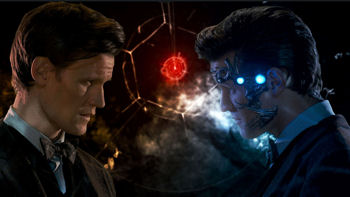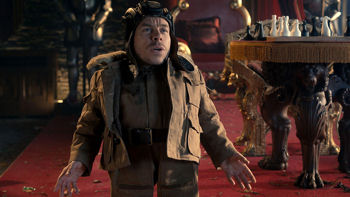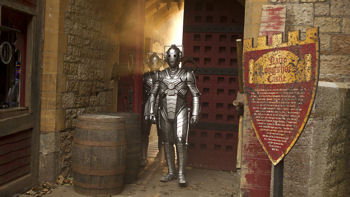After "The Doctor's Wife," a cozy little story about a man and his TARDIS, it was hard to imagine Neil Gaiman's next script being a Cyberman story. It was even harder not to let my heart sink when "Nightmare in Silver" started out looking like the second remake of "Dalek" in this half-season (the first being "Cold War," of course).
Once again we have the last scion of a monster race thought to be long dead, held captive by humans, biding its time before it escapes and begins to wreak havoc. Fortunately the story blossomed out from there, and the result is a serious contender with "Hide" as my favorite of the season.
The secret's in the characters. Motley crews like this are a Gaiman specialty. They're not all equally charming; Angie in particular lays on the sullen teenager act pretty heavily, but Gaiman gives her a few good moments to help make her bearable. Her brother Artie is angelic by comparison, but if you're allergic to child actors you can take comfort in the fact that both spend a large part of the story effectively unconscious.
Then there's Mr. Webley, who serves mostly as a rather convoluted way of getting the Cybermen into the story but himself gets at least one terrific scene ("he only wants to destroy you...at chess!" is perfectly delivered). But then there's the punishment platoon, who are just this side of ridiculous and full of charming lines ("is it okay if I hide?" just barely losing out to "but you signed for that!" as my favorite). And of course there's Porridge, played with perfect pitch by Warwick Davis, perhaps the best thing going in an episode full of treats.
 |
And then there's the Doctor and Mr. Clever, and this is the point where I'm forced to concede that charming is subjective and it's a sure thing that some fans found the motley crew unbearably cutesy. Here's the thing: there are a few scares, but they give way to fun pretty quickly, about the time Matt Smith gets to play Two-Face. It's over-the-top, because the Cyberplanner version of the Doctor is as bonkers as the Doctor version of the Doctor. But it's also subtle, in that the two of them sound very much alike, and this seems like an odd choice until you realize that all of the later scenes where Clara isn't sure which persona she's talking to wouldn't work if the Cyberplanner spoke in a monotone or a Bale-Batman rasp.
So both of them are funny, and even Mr. Clever is too adorable to really worry about, and if this isn't your cup of tea, you might be wondering if there's any real danger left in this show at all.
But it was my cup of tea, and the second time I watched it, even though I still found certain plot elements confusing (how did Porridge end up working as a professional chess player? how did all of these characters end up on the same planet together? what triggered the Cybermen to start reconstituting themselves all of a sudden?), I enjoyed it even more.
Porridge beaming up even put a lump in my throat, because I'd had more time to think about what it meant to him, what he was giving up. Being really creeped out or scared by Cybermen suddenly seemed less interesting, less necessary. My understanding is that Gaiman started out aiming for that, and ended up going for fun, and quite right too.
Clara remains an exceedingly pleasant screen presence, but beyond that and her Jenna-Louise Coleman's ability to talk as quickly as Matt Smith, it's still very difficult to pin an actual personality on her. It's mystifying how swiftly and seamlessly she steps into the role of platoon leader; sure, these are the Bad News Bears of soldiers, but they're not that incompetent.
Her ability to step into any role that's required of her, and the sense that she's playing it as a role, like a little girl dressing up in grownup clothes and acting out her favorite books, are in sync with her barmaid/governess quick-change act in "The Snowmen," but it makes for a frustratingly opaque character. Beyond her flashes of anger when the kids are threatened and her cute giggle at Porridge's "handy" joke, she doesn't display a lot of emotion other than steely resolve.
Classic series watch:
If there were any direct references to classic Cybermen stories, they went over my head, other than the word "moonbase" early on (a probable nod to 1967's "The Moonbase," the second-ever Cybermen story).
However, I have to credit my friend Jeff once again for pointing out the similarities between the Emperor of the Galaxy, on the run from his own people, and the Doctor himself. The scene in which he must trigger the planetary implosion device in order to save everyone, but can't do so without summoning his people who will force him to take responsibility for fleeing, is strongly reminiscent of the equivalent scene at the end of 1969's "The War Games."
 |
Therein, the Doctor summons his own people to help him return kidnapped soldiers to their own times, and we meet the Time Lords for the very first time.
The resonance of this moment might not mean much to someone who started with New Who, and knows the Time Lords mostly as a cult of slavering megalomaniacs. But until 1969, the Doctor had been a mysterious prodigal, more given to puttering around the universe helping people than acknowledging his heritage, and since after summoning the Time Lords he was put on trial and forced to regenerate, the self-sacrifice of the act was just about as noble as anything he'd ever done.
That's why imagining the Emperor as a parallel figure to the Doctor, as Jeff suggested, made me choke up the second time through. That, and Davis's acting, and Gaiman's writing, and my being a big nerd.
One more classic series nod, almost certainly unintentional: instead of ten years or a hundred years, which I could almost have bought, Gaiman joins a long tradition of adding superfluous zeroes to timespans in Doctor Who (see "Genesis of the Daleks" for just one instance), rendering them almost totally implausible. A thousand years since the Cybermen were defeated, guys, really? And you still have weapons around to fight them that aren't in a museum somewhere? So much for Moore's Law!










